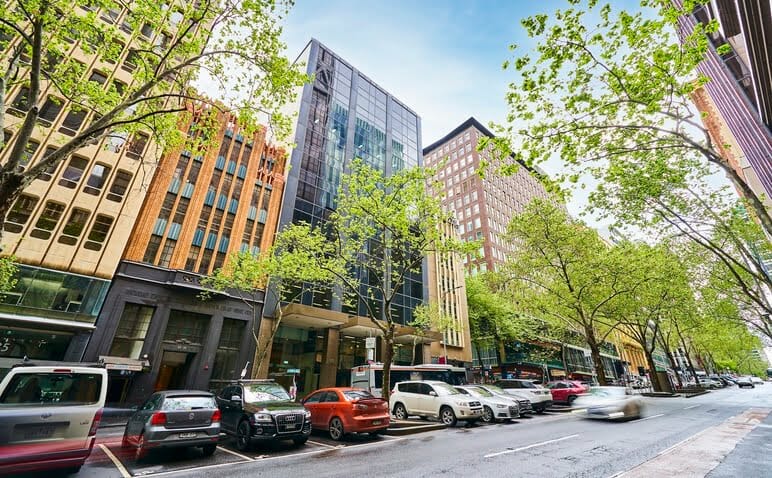
The buyer of 99 Queen Street (third building from left) is a first-time investor in Melbourne’s CBD market
An unidentified mainland Chinese investor has acquired an ageing building in Melbourne’s central business district, marking the first major office deal of 2023 in Australia’s second-largest city.
The 12-storey office block at 99 Queen Street changed hands after a competitive bidding process that drew more than 200 buyer enquiries from across mainland China, Hong Kong, Singapore and Australia, according to property consultancy JLL. The Age, a Melbourne-based newspaper, reported a sale price of A$30 million ($20.2 million) for the 1967-era building.
Expressions of interest were handled by Josh Rutman, executive director and head of capital markets for the state of Victoria at JLL, and fellow agents Nick Peden and Mingxuan Li on behalf of a family after 17 years of ownership. Despite lower-than-average deal volume in the Melbourne CBD, Rutman said the transaction offered evidence that offshore groups are recognising value in well-located assets even if they require substantial upgrades.
“We are seeing a notable influx of enquiry and bidding from Singapore, Hong Kong and mainland China, which we expect to increase as the year progresses,” Rutman told Mingtiandi.
First-Time Entrant
Situated one block north of Melbourne’s busy Collins Street, 99 Queen Street has a net lettable area of 4,682 square metres (50,397 square feet) and is 48 percent occupied by a dozen tenants. The building features basement retail space and floor plates averaging 379 square metres in size.

Josh Rutman, head of capital markets for Victoria at JLL
The successful purchaser, a first-time entrant into the Melbourne CBD, was sourced via JLL’s Asia markets division and paid A$6,408 ($4,316) per square metre of NLA for the freehold property.
According to JLL, the buyer took into account significant upgrade works needed to bring the building up to standard and ensure its appeal to tenant expectations. The agency’s research has found that 46 percent of tenant briefs indicate a preference for nothing less than a Grade A office building, spurring investors to seek Grade B buildings — as opposed to development sites — to conduct a refurbishment programme in order to capture future tenant demand.
“The prospect of finding an appropriately sized parcel of land has diminished as the CBD has been largely built out,” Rutman said. “If you couple this with the increasing cost of construction, the alternative of refurbishing older buildings has become the preferred avenue for investors.”
CBD Market Cools
Melbourne’s CBD has seen a drop-off in big-ticket office deals after enjoying a flurry of acquisitions by Asia-based investors last year.
In August, Singapore sovereign fund GIC bought a 50 percent stake in 555 Collins Street, a A$800 million office project, from Charter Hall after the Australian property giant secured e-commerce titan Amazon and pension fund Aware Super as anchor tenants.
Two months earlier, City Developments Ltd teamed up with fellow Singaporean investor HThree City to acquire the 18-storey 330 Collins Street for A$236 million, marking an expansion by CDL into the Australian office sector.
Also in June, Singapore’s CapitaLand Investment acquired the 22-storey 120 Spencer Street for a reported A$325 million on behalf of the company’s flagship regional core-plus fund.
Hong Kong’s Link REIT had kicked off the buying binge in early 2022 with the A$596 million purchase of a half-stake in an Australian office portfolio from Canada’s Oxford Properties, giving Asia’s biggest listed property trust its first presence in Melbourne at 567 Collins Street.
Leave a Reply